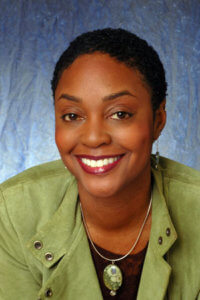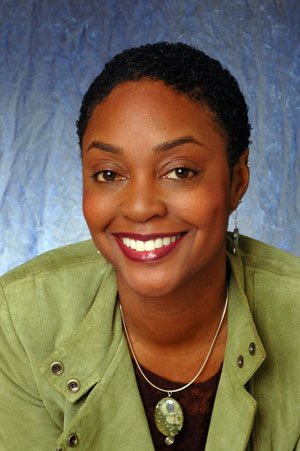An Interview With Lucretia Murphy, Senior Director, Jobs for the Future (JFF)
In this interview, Lucretia Murphy reveals milestones along her professional pathway that brought her to creating a world where young adults thrive and her three questions for perspective-taking: In this situation what am I grateful for? What am I learning? What can I do to move forward?
Mom. Reader. Justice-Seeker.
LinkedIn
Tell me about your current role?
As senior director at Jobs for the Future (JFF), I work with stakeholders to develop strategies, policies, programs that disrupt existing  barriers to economic mobility – and create structures that make it possible for people to advance through education and training to achieve economic mobility. My work focuses on challenges and opportunities for particular populations: young adults – sometimes called opportunity youth – ages 18 to 24 or 26 who aren’t in school, aren’t working, and aren’t making the progress they want to make; and older adults facing significant social and systemic barriers, like people currently or formerly incarcerated; and addressing the impact of intersectional barriers for women of color. My work also considers how “place” is impacted by intractable barriers and how we can develop policies to help neighborhoods and regions become more vibrant so people can move forward.
barriers to economic mobility – and create structures that make it possible for people to advance through education and training to achieve economic mobility. My work focuses on challenges and opportunities for particular populations: young adults – sometimes called opportunity youth – ages 18 to 24 or 26 who aren’t in school, aren’t working, and aren’t making the progress they want to make; and older adults facing significant social and systemic barriers, like people currently or formerly incarcerated; and addressing the impact of intersectional barriers for women of color. My work also considers how “place” is impacted by intractable barriers and how we can develop policies to help neighborhoods and regions become more vibrant so people can move forward.
What types of partnerships do you have to leverage to address the interrelated, nested barriers?
The challenges are systemic, so cross-sector partnerships are required for doing the work. These partners include agencies that people connect with for social services, like housing authorities, family and children services, the systems for education – both K-12 and higher education, and the workforce system. For initiatives that work with people currently or formerly incarcerated, we also work with the criminal or juvenile system, justice advocates, and legal organizations.
We also work with organizations that are separate from the system, like community-based education or development agencies, other mission focused national non-profit organizations, and employers.
What key roles prepared you for this body of work at JFF?
I was a lawyer for a few years then returned to school to pursue a Ph.D. I studied higher education policy with a focus on the transition from high school to college. After completing my dissertation, a colleague recruited me to work at JFF on regional and national initiatives to build local vehicles to advance strategies to promote mobility and self-sufficiency for young adults.
I also served as executive director at See Forever Foundation/Maya Angelou Schools, a network of alternative charter schools in Washington, DC, including the school at the New Beginnings Youth Development Center (juvenile confinement facility) and the Young Adult Learning Center for young adults exiting incarceration. I returned to JFF to continue this work for economic advancement and develop place-based regional economic development work.
Over the course of my career, I have been a generalist. I’m interested in how people sit in the intersections of policies, systems, and programs and how at those intersections we see the fault lines of the entire system. How to correct that has really been the focus of my work. There are racial and ethnic inequalities in the outcomes for young adults and people who have been incarcerated. I can see fault lines with how these systemic and social barriers create cumulative disadvantage.
If there was a soundtrack of greatest hits related to your career, what songs would make the list?
“What’s Going On” by Marvin Gaye for sure. I am so not good at songs, but poems that resonate are “A Dream Deferred” by Langston Hughes and “Phenomenal Woman” and “Still I Rise” both by Maya Angelou.
Work in the social sector can be very personal and linked to one’s values. Can you think of a time when your values were in tension and how you reconciled that tension or not?
I feel the most tension when the constraints of the institution make it ill served or directly contradictory to helping people and the gap between what needs to be done and what can be done surfaces. I remember in the school context being on this track for school improvement but so many times I felt we just needed to hold off and support some kids in crisis. Making sure students had secure and safe housing was a need I wish I could have addressed. Some women were pressured into sex work since they needed somewhere to live. I wish I could have gone deeper to the root causes and issues facing students.
Where tensions emerge in this work as an intermediary is feeling like it’s too slow. Changing narratives, directly addressing racism and intersectionality, and changing policies seems to be muted.
Can you share an experience where you have had to reclaim your time? What was the context? How did you navigate it? What was the outcome?
I have two sons and have become better at reclaiming my literal time. When Jadyn was adopted, I was at See Forever with a 24/7 job. I didn’t have maternity leave and was constantly working. In the last two years, I have become much more conscious of keeping my time as my time. When I am sick, I take a sick day. I don’t try to be on calls and do work while I’m home sick. I’m much more intentional that “vacation means vacation.” If there is a reason I need to be connected to work, then I’m very intentional that I’m only working on that targeted piece of work. By doing that, people I work with the most notice that is happening. When more junior people notice me doing that, it gives them permission to do it. I try to model so people can see that’s a way of working.
I’ve had the experience Representative Maxine Waters had where I have been on a panel and another panelist cuts me off. I let them finish, but then return to what I was saying. If misapplied credit is given for a comment I’ve made, that’s problematic. I say, “No, that’s what I said.” I’m trying to make space for junior staff – particularly staff of color – to make room for themselves. They may feel intimidated by speaking up. I’m only able to do what I do now since I practiced this earlier in my career.
What’s your approach to self-care or self-compassion? Are there any rituals you use to sustain yourself?
I’m trying to get better…currently, self-care involves chocolate or ice cream which is not so good as I’m approaching 50. (Laughter.) I’m more forgiving of my mistakes and acknowledge mistakes are learning moments. I don’t give in to self-condemnation and try not to get stressed out by focusing on the petty stuff when I have big goals to achieve.
In those moments when I am stressing out on pettiness, l try to shift perspective. Breathing and shifting perspective are key. I ask myself: In this situation what am I grateful for? What am I learning? What can I do to move forward? This probably falls more under self-compassion.
I’m making a commitment to moving every day and working better on eating. But I just love to eat and love lots of food. I need to move from self-care being comfort food to self-care as exercise.
We come from a resilient and strong lineage. How would you describe the type of ancestor you want to be and why?
I really want to be the kind of ancestor that people look to and see love and light. I want my children, grandchildren, nieces, and nephews to remember who I was. How I loved them and loved others with a bright light leading the way in the future. I don’t know of an ancestor who wasn’t that for me. They were amazing forces – spiritual and physical forces of good. A force for good who changed people’s lives. When I meet people who know my grandparents, they tell me how good they were, how much they trusted them, and how they changed their lives with love and support.
What advice would you offer other Black women trying to develop or amplify their voice and become self-advocates?
Practice. Sometimes younger people think when they get a certain position or salary THEN they will be able to do speak up. You must practice being a self-advocate. You must do it afraid.
I remember when I was turning 40 and people said that at age 40 you wouldn’t be afraid of anything. I never thought there would be a time when I wouldn’t be afraid. When you’re doing something bold like advocating on your behalf or someone else’s just do it even if you are afraid.
Always always always amplify other people. Don’t tear them down or minimize their gifts; go in the other direction. The person who always writes so well, compliment their writing. Amplify and build up other people around you. That builds you up and you grow from it. Acknowledge the gifts that other people are sharing especially in situations when others compete with you. Don’t accept the invitation to be someone’s rival. It never works out well for those people and in the long run, you don’t gain the skills needed. Give public credit when it’s due and be supportive about it.
Know what you’re doing. You can’t get by – this is so important for people of color particularly – in a white environment without doing your best. Learn what you need to learn. Do your best. Be expert in what you’re doing. Know how to navigate your own space and interests. Don’t try to just get by but get really good at what you do.
If you could change the social sector in a way that would benefit, lift up, or affirm Black women, what would that change be?
Put more Black women in charge and acknowledge their leadership. Way too often Black women are leading in various ways and doing the work, but not given authority. I think it’s damaging.



Comment section